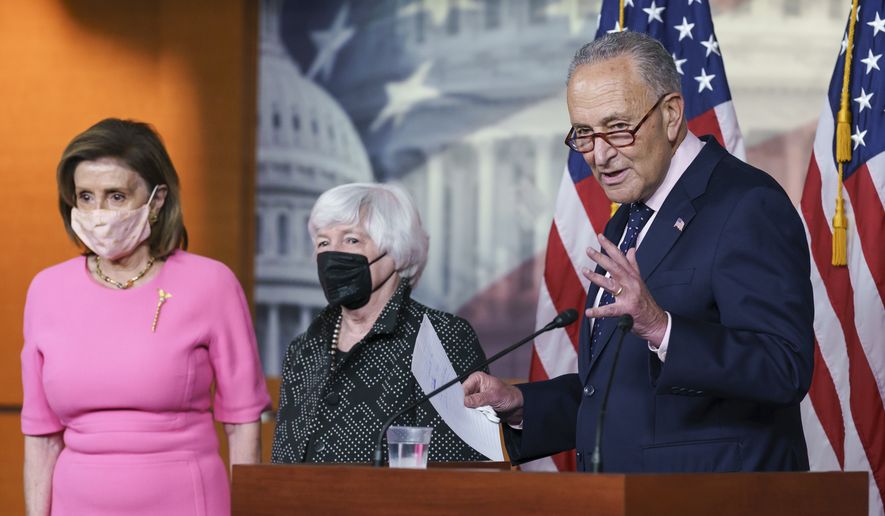Republicans and Democrats are once again careening toward a government shutdown and credit default.
The showdown is set Monday when Senate Majority Leader Charles E. Schumer has scheduled an initial vote on a short-term funding measure to keep the government afloat and suspend the debt limit for a year.
“Democrats will be united in supporting the passage,” said Mr. Schumer, New York Democrat. “It’s the right thing to do for the American people.”
He needs at least 10 Republicans to back the legislation to overcome the 60-vote filibuster threshold. He prodded them, noting that raising the cap on how much the government can borrow to pay for federal expenditures has generally received bipartisan support.
The shutdown deadline is Thursday.
Most GOP senators, with the vocal support of former President Donald Trump, are refusing to support any hike to the debt-ceiling. They say if Democrats are content to pass President Biden’s $3.5 trillion social welfare bill in a party-line vote, they should also be responsible for raising the debt ceiling to make that spending possible.
“From the start, they planned to use a party-line fast-track process to ram through the Senate … their vision of America,” said Senate Minority Leader Mitch McConnell, Kentucky Republican. “If they want to tax, borrow, and spend historic sums of money without our input, they’ll have to raise the debt limit without our help. This is the reality.”
Congress must pass an annual budget by Sept. 30 to keep the government running. In recent years as lawmakers have regularly missed the deadline and relied on short-term funding bills to buy more time.
This year, Mr. Schumer and House Speaker Nancy Pelosi, California Democrat, tied the stop-gap measure to legislation suspending the federal debt-ceiling until December 2022.
The Democrats are calling their push for a bipartisan vote to suspend the debt ceiling a matter of principle.
“Archaic rules require us to sign off once to spend the money and again to remove it from our piggy bank — even though it’s already spent,” said Rep. Katie Porter, a California Democrat who serves on the House Oversight and Reform Committee.
Democrats say that suspending the debt ceiling for a year will give them time to focus on Mr. Biden’s legislative agenda, which is already bogged down by intraparty fighting.
Party leaders also privately view the fight as one that could be politically advantageous ahead of what is expected to be a grueling midterm election. They also know that raising the debt limit while pushing through roughly $4.7 trillion in new spending will expose them to campaign attacks for reckless spending.
Mr. Schumer and Mrs. Pelosi hope that by putting Republicans on record now, they can save their meager majorities.
“At the end of the day, the only thing that matters in a legislative body is how you vote,” said Mr. Schumer. “Every single member of this chamber is going to go on record as to whether they support keeping the government open [and] averting a default or support shutting us down and careening our country towards a first-ever default.”
Republicans, meanwhile, are playing with fire.
The GOP has been burned repeatedly for being the “shutting down the government” party. If a shutdown and default occur, Republicans risk losing credibility on issues of fiscal responsibility.
“If they vote no, they will be solidifying themselves as the party of default,” Mr. Schumer said.
Republicans counter that Democrats are the ones playing political games.
GOP lawmakers have pledged to support a “clean” spending bill to keep the government open while urging Democrats to deal with the debt ceiling unilaterally using budget reconciliation. The process, which Democrats plan to use to pass Mr. Biden’s $3.5 trillion package, allows some spending and tax measures to avoid a filibuster and pass with a simple majority of 51 votes.
“They have every procedural tool they need to promptly advance a separate stand-alone piece of legislation addressing the debt limit without a single Republican vote,” said Mr. McConnell.
Republican leaders claim that Democrats are wary to go it alone because it would force them to specify an exact figure for the debt ceiling. Such a number, which will be above the current limit of $28.5 trillion, opens vulnerable Democrats up to attack.
“Why should Democrats go on record with hiking the debt-ceiling to above $30 trillion all on their own,” said a Democratic aide, who requested anonymity. “When all that will happen is that Republicans will use the figure to bash our candidates over the head relentlessly.”
Given the intransigence on both sides, Mr. Schumer’s bill to keep the government running and suspend the debt ceiling faces long odds.
At least 10 Republican defections will be needed to break a filibuster. At the moment, only four GOP senators are likely to back the bill.
• Haris Alic can be reached at halic@washingtontimes.com.




Please read our comment policy before commenting.